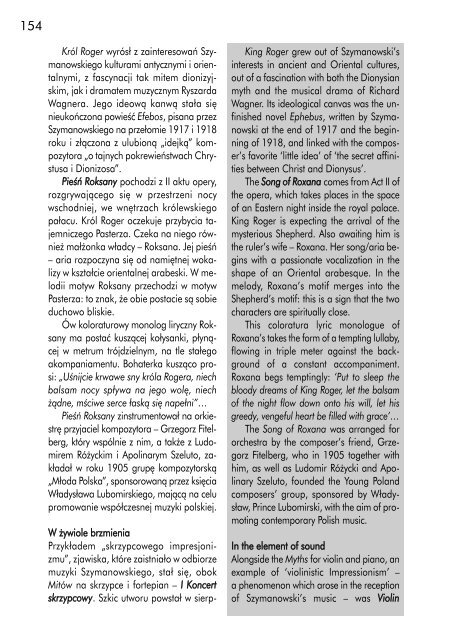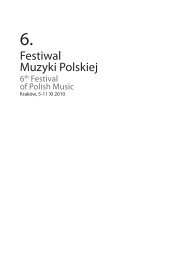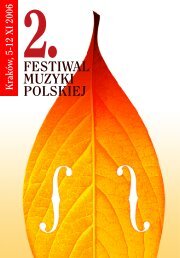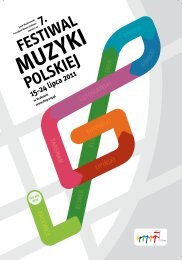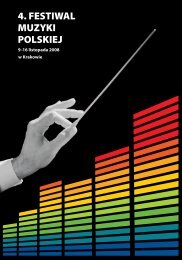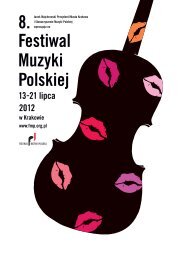You also want an ePaper? Increase the reach of your titles
YUMPU automatically turns print PDFs into web optimized ePapers that Google loves.
154<br />
Król Roger wyrósł z zainteresowań Szymanowskiego<br />
kulturami antycznymi i orientalnymi,<br />
z fascynacji tak mitem dionizyjskim,<br />
jak i dramatem muzycznym Ryszarda<br />
Wagnera. Jego ideową kanwą stała się<br />
nieukończona powieść Efebos, pisana przez<br />
Szymanowskiego na przełomie 1917 i 1918<br />
roku i złączona z ulubioną „idejką” kompozytora<br />
„o tajnych pokrewieństwach Chrystusa<br />
i Dionizosa”.<br />
Pieśń Roksany pochodzi z II aktu opery,<br />
rozgrywającego się w przestrzeni nocy<br />
wschodniej, we wnętrzach królewskiego<br />
pałacu. Król Roger oczekuje przybycia tajemniczego<br />
Pasterza. Czeka na niego również<br />
małżonka władcy – Roksana. Jej pieśń<br />
– aria rozpoczyna się od namiętnej wokalizy<br />
w kształcie orientalnej arabeski. W melodii<br />
motyw Roksany przechodzi w motyw<br />
Pasterza: to znak, że obie postacie są sobie<br />
duchowo bliskie.<br />
Ów koloraturowy monolog liryczny Roksany<br />
ma postać kuszącej kołysanki, płynącej<br />
w metrum trójdzielnym, na tle stałego<br />
akompaniamentu. Bohaterka kusząco prosi:<br />
„Uśnijcie krwawe sny króla Rogera, niech<br />
balsam nocy spływa na jego wolę, niech<br />
żądne, mściwe serce łaską się napełni”…<br />
Pieśń Roksany zinstrumentował na orkiestrę<br />
przyjaciel kompozytora – Grzegorz Fitelberg,<br />
który wspólnie z nim, a także z Ludomirem<br />
Różyckim i Apolinarym Szeluto, zakładał<br />
w roku 1905 grupę kompozytorską<br />
„Młoda Polska”, sponsorowaną przez księcia<br />
Władysława Lubomirskiego, mającą na celu<br />
promowanie współczesnej muzyki polskiej.<br />
W żywiole brzmienia<br />
Przykładem „skrzypcowego impresjonizmu”,<br />
zjawiska, które zaistniało w odbiorze<br />
muzyki Szymanowskiego, stał się, obok<br />
Mitów na skrzypce i fortepian – I Koncert<br />
skrzypcowy. Szkic utworu powstał w sierp-<br />
King Roger grew out of Szymanowski’s<br />
interests in ancient and Oriental cultures,<br />
out of a fascination with both the Dionysian<br />
myth and the musical drama of Richard<br />
Wagner. Its ideological canvas was the unfinished<br />
novel Ephebus, written by Szymanowski<br />
at the end of 1917 and the beginning<br />
of 1918, and linked with the composer’s<br />
favorite ‘little idea’ of ‘the secret affinities<br />
between Christ and Dionysus’.<br />
The Song of Roxana comes from Act II of<br />
the opera, which takes places in the space<br />
of an Eastern night inside the royal palace.<br />
King Roger is expecting the arrival of the<br />
mysterious Shepherd. Also awaiting him is<br />
the ruler’s wife – Roxana. Her song/aria begins<br />
with a passionate vocalization in the<br />
shape of an Oriental arabesque. In the<br />
melody, Roxana’s motif merges into the<br />
Shepherd’s motif: this is a sign that the two<br />
characters are spiritually close.<br />
This coloratura lyric monologue of<br />
Roxana’s takes the form of a tempting lullaby,<br />
flowing in triple meter against the background<br />
of a constant accompaniment.<br />
Roxana begs temptingly: ‘Put to sleep the<br />
bloody dreams of King Roger, let the balsam<br />
of the night flow down onto his will, let his<br />
greedy, vengeful heart be filled with grace’…<br />
The Song of Roxana was arranged for<br />
orchestra by the composer’s friend, Grzegorz<br />
Fitelberg, who in 1905 together with<br />
him, as well as Ludomir Różycki and Apolinary<br />
Szeluto, founded the Young Poland<br />
composers’ group, sponsored by Władysław,<br />
Prince Lubomirski, with the aim of promoting<br />
contemporary Polish music.<br />
In the element of sound<br />
Alongside the Myths for violin and piano, an<br />
example of ‘violinistic Impressionism’ –<br />
a phenomenon which arose in the reception<br />
of Szymanowski’s music – was Violin


